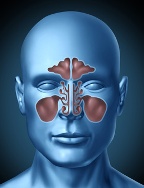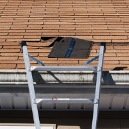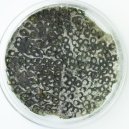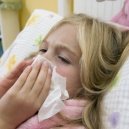Find a pre-screened local mold removal specialist Free Estimate
Find a Mold Specialist Now
Click or Call, Toll-Free 24/7
Sinus Congestion
From Mold Exposure
Sinus congestion, also referred to as sinusitis or a sinus infection, is one of many potential health effects of mold exposure. It causes the sinuses, or nasal passages, to become swollen and inflamed. This interferes with drainage, so you feel stuffed up. Other symptoms include headache, facial tenderness or pain, trouble breathing through your nose, coughing, earache, and fever.
Causes of Sinusitis
Sinusitis can be caused by many things. According to the Mayo Clinic, the most frequent cause is the common cold. Other causes include other types of viruses, bacterial infections, environmental allergies (like hay fever), and fungal infections. Exposure to mold can also cause sinusitis. Some people are allergic to mold, which triggers sinus problems for them. Mold is also a fungus, and tiny mold spores drift around in the air, where they are easily inhaled. These mold spores irritate and inflame the linings of the sinus cavities, throat, airways, and lungs.
Treating Sinus Congestion Caused by Mold

While sinusitis caused by the common cold virus generally gets better without medical treatment, just like a cold does, sometimes sinusitis does require medical care. Bacterial infections may require antibiotics. Fungal infections may require prescription medication, as well. If allergies to mold or other substances are causing sinusitis, immunotherapy (allergy shots) may help.
Over-the-counter remedies can relieve some symptoms of sinus infections. For instance, decongestants help relieve sinus congestion. Saline nasal spray can help clear clogged nasal passages and soothe inflamed mucous membranes. Over-the-counter pain relievers like acetaminophen (Tylenol) or ibuprofen (Advil, Motrin, Aleve) can relieve sinus pain.
Sinusitis caused by mold will almost certainly not resolve completely, though, even with medical treatment, as long as you continue to be exposed to mold. Symptoms may abate temporarily but will probably return and may even worsen. You’ll need to have your home thoroughly cleansed of all traces of mold if mold is causing or contributing to your sinus problems.
Other Health Effects of Mold
Sinus problems are by no means the only health problem that can be cause by mold. Other possible health effects of mold include:
- Shortness of breath
- Coughing
- Sneezing
- Sore throat
- Bronchitis
- Pneumonia
- Asthma attacks
- The development of scar tissue in the lungs
- Bleeding in the lungs
- Headache and/or migraines
- Skin reactions like rashes or hives
- Digestive problems
- Joint inflammation and/or pain (symptoms similar to rheumatoid arthritis)
- Depression
- Fatigue
As with sinus problems related to mold exposure, these other health problems probably will not respond fully to medical treatment as long as you continue to suffer exposure to mold.
Is Mold Causing Your Sinus Problems or Other Symptoms?
Finding out if you have a mold problem is not as easy as you might think. Mold can grow in all sorts of hard-to-reach places, like inside walls, above ceiling tiles, underneath carpets and floorboards, and inside ventilation systems. You might be aware of a mold problem in your bathroom or basement, but mold spreads easily throughout the home and if you have mold in one area, you might have mold in other places as well where it’s just not visible.
We recommend calling in a professional mold tester, so you can find out the extent of your mold problem and locate all mold in the home. Most professional mold testers are engineers, and they are trained to test both the air and various surfaces in your home for mold, making sure they locate all areas affected by mold growth. If they find mold in your home, they can give you valuable advice about the mold removal process. To find certified mold testers in your area, just follow this link.
Free Home Inspection By A Mold Removal Specialist
Search This Website
Recent Articles
-
See Our 5 Recommended Mold Removal Companies in Covington, KY
Apr 16, 25 12:59 PM
-
See Our 5 Recommended Mold Removal Companies in Wheaton, IL
Jun 20, 24 10:33 AM
-
See Our 5 Recommended Mold Removal Companies in Aberdeen, SD
Oct 08, 21 04:05 PM





